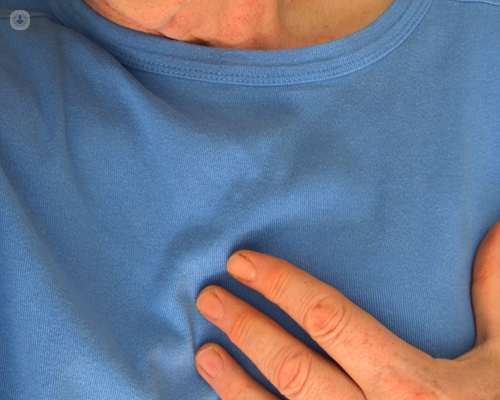Getting expert help for coronary heart disease
Autore:
Coronary heart disease, sometimes called ischaemic heart disease or coronary artery disease, is a serious condition that affects many people around the globe.
Here to provide a detailed take on coronary heart disease symptoms, diagnosis and treatment is leading consultant cardiologist in Cambridge and London, Dr Charis Costopoulos.

What is coronary heart disease?
Coronary heart disease refers to disease of the arteries that supply the heart. Most of the time this tends to be due to atherosclerosis, which refers to the deposit of lipid and fibrous tissue in the wall of the artery. This is something that we all have and, in most cases, it tends to be without symptoms; what we call asymptomatic. We all have a degree of disease in our arteries, and most of us, or quite a few of us, won't develop symptoms from it for the entirety of our lifetime.
Coronary heart disease tends to develop but in the formation of lipids and inflammation of the artery wall to the point that the artery starts to narrow progressively over time.
What are the signs and symptoms of coronary heart disease?
Most of the time, it may not cause any symptoms, or it can present in two ways:
One is the artery becomes more and more narrow with time;
Patients can have angina symptoms, which tends to manifest in chest pain or chest tightness on exertion.
This doesn't always need to be the case. We know in women in particular, coronary artery disease can cause atypical symptoms, such as breathlessness on exertion or jaw pain, or other symptoms that aren't so typical of coronary artery disease.
Sometimes, coronary artery disease can manifest itself acutely where the narrowing in the artery may not be severe enough to cause chest pain when you exert yourself, but you may get some disruption of the area of the disease in arteries where platelets and other clotting factors are involved. All of a sudden you get a blocked artery, and therefore a heart attack.
Although you may not have symptoms of coronary artery disease, in our practice you see quite a few patients that present acutely with a heart attack that doesn't necessarily have any significant warning prior to that.
How is coronary heart disease diagnosed?
Coronary heart disease is diagnosed in one of two ways:
- One is with anatomical tests;
- And secondly with functional tests.
If you present to your GP or cardiologist with chest pain, guidelines suggest a stress line treatment depending on your previous history; to undergo a CT coronary angiogram. That allows us to see if there's any disease in arteries, and it also allows us to see if there's any significant narrowing in the arteries of the heart.
If you've had previous heart problems, or had previous surgery, a stent treatment, or you already have narrowing of the arteries already, then a functional test may be better. This can either be:
- An MRI;
- A stress echocardiogram, or;
- Exercise tests.
The first line of investigation for patients that come with chest pain in the absence of previous history of coronary heart disease, tends to be a CT coronary angiogram.
How is coronary heart disease treated? Can this condition be cured?
Treatment of coronary heart disease depends on the presentation. The first thing that we do, as cardiologists, with coronary artery disease is to try and reduce, stop or prevent further progression of disease.
For that reason, patients who have coronary artery disease need to go on treatment that we stop the disease getting worse, or reduce the disease getting worse. That will include you being prescribed cholesterol tablets irrespective of your cholesterol levels, aspirin and probably one of two more tablets that will slow the condition from progressing.
If you suffer from angina - chest pain on exertion - we know this comes from coronary artery disease. The way we treat this depends on the anatomy of coronary heart disease. Guidelines suggest that as long as you don't have critical anatomy - that tablet therapy should be tried first, and that tends to be with one or two various tablets that you can discuss with your cardiologist.
If you undergo investigations including cardio angiogram that suggest you have coronary artery disease in the very proximal parts of the arteries, and it's significant, you can have a discussion with your cardiologist on how to best treat this. In my practise, when there is critical disease in the very proximal areas, then re-vascularisation, either with stents or coronary bypass graft surgery will be considered.
The details of what treatment is best suitable for the patient depends on your anatomy, and of course your preference, and discussions that you have with your cardiologist.
If you're concerned about coronary heart disease and would like more information, you can book a consultation with Dr Costopoulos by visiting his Top Doctors profile.


